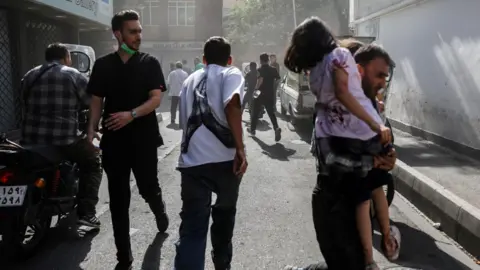The situation in Iran has recently escalated to alarming heights, following a series of Israeli air strikes that have left the populace feeling extremely vulnerable. Many residents describe their lives in Iran as feeling utterly “stuck.” This prevailing sentiment captures the essence of despair and helplessness as they face the realities of their nation being embroiled in what feels like an active conflict zone. The air strikes, which have been described as some of the largest in years, have sent shockwaves throughout Tehran, with citizens desperately attempting to escape the city to find safety, albeit with little success due to overwhelming traffic congestion and the inability to leave broader provincial areas.
Long lines at petrol stations characterise Tehran as families prepare to flee to quieter parts of the country, seeking refuge from what they consider possible targets of future attacks. However, residents are quick to note the absence of official warnings or sirens that once provided guidance during past conflicts. The current attacks have created an atmosphere of uncertainty where the reality of bomb blasts becomes the only reminder of danger. One unnamed resident mournfully acknowledged, “Tehran isn’t safe, clearly.” The sense of vulnerability is palpable, and many express a dire need for reliable alerts that could potentially save lives in such circumstances.
While some have managed to leave Tehran for other provinces, many admit they are struggling to come to terms with the fact that they are living in a war zone. An individual who relocated from Tehran articulated a common sentiment: “This is not my war. I’m not rooting for either side; I just want to survive along with my family.” These words encapsulate the ordinary person’s plight, highlighting how the conflict impacts citizens who are simply trying to safeguard their loved ones without getting embroiled in political struggles. As for the air strikes themselves, they have reportedly resulted in significant fatalities; with at least 10 individuals killed in Israel and Iranian reports indicating over 128 casualties in Iran.
Moreover, the psychological toll is particularly pronounced among those who have endured traumatic experiences from past wars. One resident reminisced about the Iran-Iraq war, layering a haunting comparison of youth innocence against the backdrop of active conflict. “Back then, at least we heard air raid sirens or received warnings,” she recounted, indicating a profound sense of loss and nostalgia for the kinds of alerts that once existed and served to prepare communities for impending danger.
Younger generations, meanwhile, find themselves ill-equipped to navigate these circumstances, given that they have not lived through similar crises. A woman in Tehran noted that many seek a quiet escape to smaller towns or villages, but family obligations and concerns for loved ones who cannot leave tie them to the chaos of the capital. “What we’re experiencing is not fair to any of us, the people of Iran,” she lamented, emphasizing the collective suffering of those caught in the crossfire.
Internet connectivity issues further complicate life in Iran, as maintaining contact with family members becomes increasingly difficult amidst instability. Many Iranians living abroad are anxiously trying to establish communication, hoping their messages find a response in the chaos. Amid this turmoil, the Israeli military issued warnings for individuals to vacate areas near military sites sparking confusion and additional stress. “How are we supposed to know where a military site is?” one concerned citizen asked rhetorically, underlining the chaos of navigating one’s daily life while actively facing threats.
On a more declarative note, Israel’s Prime Minister Benjamin Netanyahu utilized the occasion to urge Iranians to rebel against their government, a message that has largely failed to resonate meaningfully on the ground, as many prioritize immediate safety over political ideologies. The unfiltered reality for the people of Iran revolves around survival as they confront the stark and unyielding nature of warfare—one which brings to light the immense price of conflict, distilling a complex situation into the experience of ordinary citizens striving for peace amidst chaos.
Overall, the unfolding events illuminate not just the grim reality of warfare but also echo profound human experiences of fear, stress, and the desire for safety, which transcend time and place. The gravity of the air strikes has evoked a spectrum of emotions, reflecting on the vast losses experienced during harrowing moments in history, and reminding the global audience of the urgent humanitarian needs and the desperate hopes of people amid conflict.



